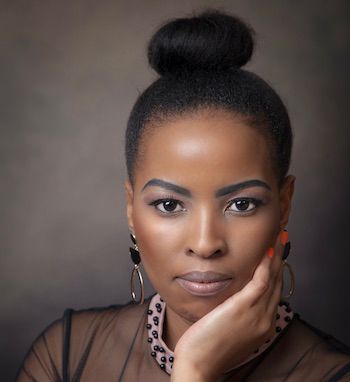Princess Mthombeni

Summary: Princess Mthombeni, a nuclear energy advocate, has provided high-level strategic support to the South Africa government in leading, executing, and ensuring the success of nuclear communication strategies. In 2021, she founded Africa4Nuclear, an advocacy campaign that promotes nuclear energy as a key contributor toward achieving Africa’s Agenda for Sustainable Development. She often sacrifices her own resources to raise awareness, and she has faced isolation and threats for her stands on global energy politics.
Profile: Princess Mthombeni was born in Nquthu, one of the villages in South Africa’s KwaZulu-Natal province with few resources and scarce energy. As Mthombeni remembers, “The area had no electricity, so we used things such as paraffin, firewood, coal, candles, and cow dung to address our energy need such as cooking and heating houses in winter. At the age of nine, I travelled three kilometres to get clean water, waking up at 4 AM. We had to get water from the fountain while it is still dark outside. I did my primary school years in the same village. I was forced to do homework before sunset because at home we had limited candles.”
Mthombeni realises that though conditions have improved in South Africa, many African countries still suffer from a lack of energy. Studies indicate that about 640 million people in all 55 African countries have no access to electricity and therefore are living in the dark. To try to improve the situation, she has become an advocate of nuclear energy. In 2021, she formed Africa4Nuclear to be a voice for her campaign for clean energy and sustainable economies in Africa. In addition, she is the Chief Editor for the Voice of Nehawu Nuclear Energy Workers Newsletter, the South African coordinator for Stand Up for Nuclear, and a leader of the African Young Generation in Nuclear.
“I strongly believe,” she says, “that access to electricity is crucial not only for the health and educational improvement of our people, but also for unlocking the economic potential of Africa and therefore lifting many people out of poverty. It is against this background that I strongly believe nuclear power—as a source of energy that is clean, and reliable—is key in addressing the energy poverty on the African continent. I believe that with nuclear energy, Africa will be able to accelerate the pace to industrialisation and therefore solve the triple threats of poverty, inequality, and unemployment in the process.”
Mthombeni’s work centres around advocating for access to clean and affordable energy for all individuals, particularly in Africa. She raises awareness, engages with policy makers, and strives to empower communities to make informed decisions about their energy future. And she uses several different channels to do this: “I have reached the public and policy makers and raised awareness on the need for nuclear energy through YouTube and TikTok videos, writing editorial opinions, doing media interviews, and speaking on different platforms globally.”
Mthombeni’s efforts have borne some positive results: “Today, many people who used to be anti-nuclear are now leading conversations that South Africa must procure nuclear power. Some are even saying that, had South Africa signed a nuclear deal with Russia in 2016-17, there would now not be these constant power cuts.”
Those efforts have also engendered risks: “I have faced the risk of losing my job because of something I said in either a video or at an event I attended which unsettled some people in positions of power. At some point, I was told to ‘toe the line’ of government when I speak at international stages. Being out there in the public pushing the messages I push has made me a bit of a loner in such that some people from my industry are even afraid to be associated with me in fear of losing their jobs.”
Mthombeni has accepted those risks and forged on: “Someone once said ‘Truth-telling is becoming a lonely job in this world.’ Nevertheless, I will continue to speak my truth. Advocating for a just cause often requires making sacrifices, including time. Advocacy work can be time-consuming, involving research, outreach, meetings, and campaigns. I always have to sacrifice personal time and leisure activities.” There are financial burdens as well: At times Mthombeni uses her own money to advance her advocacy work. And there are personal burdens: “My advocacy work has strained relationships with friends, family, and colleagues who do not share the same views or understand the importance of the cause.”
However, the risks and burdens have not changed Mthombeni’s advocacy: “Despite these sacrifices, like many energy activists and nuclear advocates, I am driven by a strong sense of purpose and the belief that my work can create positive change for society and the world at large.”
